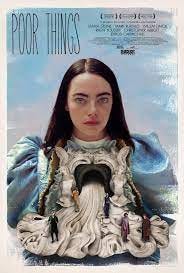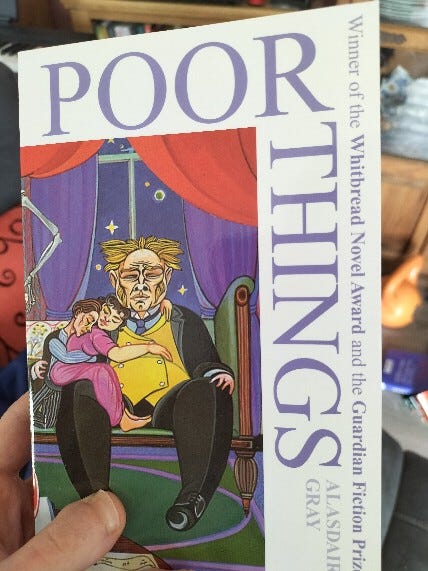"Poor Things" is my first Yorgos Lanthimos film. Yet, I've been intrigued by his success from afar. He seems to have taken David Lynch's mantle as mainstream culture's Resident Weirdo. His films don't hide their weirdness: in fact, that's the Lanthimos brand.
Why, then, is “Poor Things" so weird? Is the story so inherently oddball that it couldn't have come out any other way? A mad scientist, played by Willem Dafoe, revives the corpse of a pregnant woman who committed suicide, swapping in the baby's brain. This creature grows into Bella Baxter (Emma Stone), with the coveted body of a woman and the mind of an infant. Her attractiveness to men is the engine of the plot. Mark Ruffalo's slimy solicitor, and Ramy Youssef's naive medical student, compete for her heart.
Yes, it is a strange tale, but could have made a pretty straight animated film. The explicit scenes ruin any chance of this being kid-friendly. The multitude of graphic sex is funny, but not that distinctive. The Lanthimos touch lies elsewhere. It's a tonal thing.
Stiff Victorian formality, constantly undermined. That is the Lanthimos touch. Take this early scene. A cadaver is being is dissected in front of a hall of medical students. Youssef’s character is being teased by two of his fellow students. One speaks in long, ornate phrases. The other simply tells Youssef to fuck off. Later on, when Bella is travelling around Europe, Youssef asks the mad scientist whether he thinks they are “fucking”: Dafoe replies in the affirmative before the question mark is formed.
The word “fuck” is not funny in isolation, but in this context, it is. I’m not sure when the word came into regular parlance. Maybe the Victorians did use it so freely. But it has become known, rightly or wrongly, as an era of repression. Merriam-Webster defines the word “Victorian” as:
typical of the moral standards, attitudes, or conduct of the age of Victoria especially when considered stuffy, prudish, or hypocritical
“Poor Things” is part Charles Dickens and part South Park. The intrusion of modern speech patterns gives things a meta quality. We wouldn’t be surprised if the actors started bursting out laughing.
Un-Real
There is no attempt to disguise the fact that this is a movie. The story is told through many different color palettes and camera lenses, none of which bear any relation to real life. Early scenes are in black-and-white with some kind of snow-globe effect that makes us feel like we are watching somebody’s childhood memories. Then, when Baxter hops on a boat, we morph into old-Hollywood color, Dorothy crossing into Oz. As Baxter grows aware of financial realities and stoically takes to earning her bread through prostitution, the palette grows grimmer, though the repulsiveness of revolving customers keeps up the tone of wtf. In that respect, the film is surreally realistic. No body part is censored. I still have the imprint of a flabby buttocks in my mind. Send help.
Performance
Emma Stone does something that may be unprecedent in the history of cinema: she plays the dumbest and smartest character in the film. And pulls it off. We know Stone as a smart, quick-talking personality. Our awareness of her other roles enhances this one. I’m not sure this character works with an unknown. Bella does not have the arc you might expect. She does not grow into a normal, functioning adult. She is always impaired. Yet through her travails, she develops an odd worldliness, a coldness. She has loyalty to nobody but her god, Willem Dafoe. She uses men to her own advantage, but it doesn’t feel cruel. The character is not articulate enough to express a clear plan of revenge, and maybe revenge is not what she is after. She is lacking in conscience, and that works in her favor. A supernatural version of Veronika Voss.
Above all else, this is a great physical performance. We track Bella as she gets used to her body. She starts out walking stiffly, arms and legs immobile, most of the effort going through her hips. Her sexual awakening is a kind of homecoming. She becomes more flexible, and under the tutelage, of Ruffalo, downright acrobatic.
Beat Issues
There are lesser films that are more perfect. This is not a particularly tight script. There are redundant characters. Bella’s husband, pre-suicide, for example, who storms Bella’s wedding to Youssef, and sweeps her away. In this third act, Ruffalo disappears. I don’t know where to. The love triangle between himself, Bella, and Youssef is abandoned. At this late stage, it’s like a new film begins.
The demise of Bella’s God, should be more poignant than it is. The plot of the retuning husband gets in the way. This is one instant where some emotion would have been welcome. What does Bella think of God? Is she angry? Confused? Is she frightened of life without Him? Now there’s a climax: after over two hours of blankness, she finally shows us her heart. Alas.
If I had been the screenwriter, I’d have scrapped the husband plot. I’d have been content to turn Mark Ruffalo into a goat.
One More Thing
On a recent trip to London, I visited a wonderful bookstore named Liberia. Browsing idly, I was shocked to discover this book:
I had no idea that this was a novel first. I had to have it, not just because it’s a great film, but to see how much of the credit show go to Lanthimos and how much to Alasdair Gray. I’m looking forward to reading the book, but I’m going to go out on a limb and say there won’t be a “fuck” in sight. Betcha.



